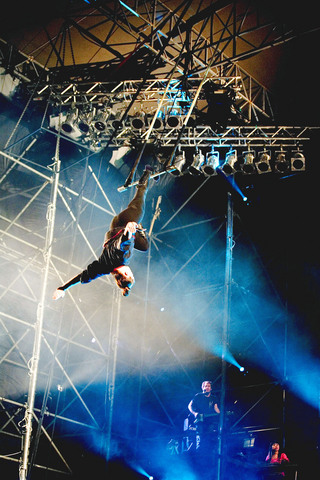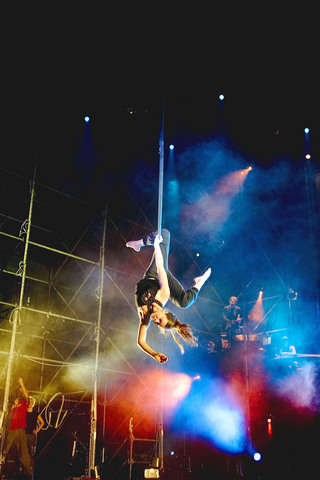Jerry Snell is a man who wears many masks. With a professional career spanning more than two decades, the interdisciplinary artist has worked variously as an actor, director, choreographer, and composer. Yet he's known mostly as a singer and musician, whose tunes are tinged with social commentary and a political edge.
Over the past few years his evolution as an artist has taken him back to his roots when he was a performer on the streets of Montreal working with friends in an experimental medium called new circus. The fruits of this transformation can now be seen at the Chiang Kai-shek Memorial Hall plaza where Snell has gathered a wide range of performers for the Spotlight on New Circus festival.
The idea for the festival emerged two years ago when programming directors from the National Theater went to Montreal to watch new circus performances. At the time, Snell had just completed his own project with the National Theater School of Canada and encouraged the delegation from Taiwan to mount a new circus festival of their own in Taipei, of which he would be a part.

PHOTOS COURTESY OF THE CHIANGE KAI-SHEK CULTURAL CENTER
“About six months ago [the National Theater] said I could do my new production, but I've got to program the festival too,” he said.
With no experience of running a festival, Snell was intimidated at first by the amount of work he knew it would involve. But because the National Theater gave him carte blanche to run the show — from auditioning performers to hiring established acts — he dove into the project with gusto.
In addition to running the show, Snell is to perform at the festival. With a mixture of foreign and Taiwanese artists, Flash is a pastiche of live musicians, live video, pre-recorded video, hip-hop, break dancing, kung fu, acrobats, and contemporary dance.

Snell said his evolution as an artist has paralleled the transformation that new circus has taken over the past few decades.
“I was with all the people who began Cirque du Soleil, so I knew all those people, but I went away from it for 15 years and I just came back and I said that this is not the circus I knew a long time ago,” he said. “This is physical theater, this is risk, experimental theater, it is clown, it is cabaret.There is no limit.”
Bringing foreign and Taiwanese performers together involves a special kind of communication.

“We work by action ... . When I worked with the traditional musicians putting them into more progressive rock songs, it was by doing it. I didn't explain what they had to do, they just got the feel,” he said.
Snell emphasizes that his collaborative style makes all members of the troupe feel like they are active participants in the decision-making process.
“I don't tell them I'm the boss, I'm the director ... . I say, ‘I'm going to work with you as I'm going to work with my band. You are my friend, you have to help me. You don't want to watch me go down and get all frazzled. You are your own boss on the stage. I've brought you the best musicians, the best lighting the best acrobats.’ That means we work as a creative team,” he said.
Snell's socialist roots are apparent in his management and creative style. Regardless of the medium Taiwanese are performing in, he chose them because their style was unique to Taiwan.
“They are street performers, they are hip-hop artists, they are kung fu artists — they don't come from a circus school, they come from what is Taiwan. I did auditions specifically for that reason — auditions for everyone,” he said.
Taking an interest in the performers in Taiwan also means getting involved with different theater groups and becoming a part of the vibrant artistic community that exists on the island.
“The idea of bringing this into the community is by making yourself accessible. It's not becoming a mega-industry where you only think about money. There has to be something where there's social contact and that's why I like working with these people because you see it developing and you see people change. You see people get confident,” he said.
Snell says that the culture of Canada incubates the kind of creativity needed to make new circus because it doesn't have any cultural traditions holding it back.
“Our whole history of performance is creating new things. The quality of our work is imagination. The quality of Taiwan's artists is a discipline and an athletic capability. So when we put the two together we have to take our creativity with their physical ability and then we make a new circus,” he said.
Contrasting the creative and artistic atmosphere between Taiwan and China, Snell says that he likes working with Taiwanese because they have a profound and deep respect for their culture and their history combined with an incredible curiosity for the new.
Though the local talent is a mixture of amateur and professional, he chose top-notch new circus and experimental theater artists from around the world.
“We've matched them [local performers] with the best circus acrobats from around the world ... . So they are coming up and matching that challenge,” he said.
The new circus troupes Snell has assembled for Taiwan all share this basic ethos of breaking down the traditional barrier between the spectator and performer, involving the former in the performance so they too become actors. Snell is also interested in providing the kind of entertainment that breaks down the barriers of language.
“The appeal of physical theater or circus in Asia is that there is no language barrier. You are doing physical work that everyone can understand,” he said.
And for Snell and his troupe of international and local performers, mounting a production that everyone can participate in and understand is what new circus is all about.

In the March 9 edition of the Taipei Times a piece by Ninon Godefroy ran with the headine “The quiet, gentle rhythm of Taiwan.” It started with the line “Taiwan is a small, humble place. There is no Eiffel Tower, no pyramids — no singular attraction that draws the world’s attention.” I laughed out loud at that. This was out of no disrespect for the author or the piece, which made some interesting analogies and good points about how both Din Tai Fung’s and Taiwan Semiconductor Manufacturing Co’s (TSMC, 台積電) meticulous attention to detail and quality are not quite up to

April 21 to April 27 Hsieh Er’s (謝娥) political fortunes were rising fast after she got out of jail and joined the Chinese Nationalist Party (KMT) in December 1945. Not only did she hold key positions in various committees, she was elected the only woman on the Taipei City Council and headed to Nanjing in 1946 as the sole Taiwanese female representative to the National Constituent Assembly. With the support of first lady Soong May-ling (宋美齡), she started the Taipei Women’s Association and Taiwan Provincial Women’s Association, where she

Chinese Nationalist Party (KMT) Chairman Eric Chu (朱立倫) hatched a bold plan to charge forward and seize the initiative when he held a protest in front of the Taipei City Prosecutors’ Office. Though risky, because illegal, its success would help tackle at least six problems facing both himself and the KMT. What he did not see coming was Taipei Mayor Chiang Wan-an (將萬安) tripping him up out of the gate. In spite of Chu being the most consequential and successful KMT chairman since the early 2010s — arguably saving the party from financial ruin and restoring its electoral viability —

It is one of the more remarkable facts of Taiwan history that it was never occupied or claimed by any of the numerous kingdoms of southern China — Han or otherwise — that lay just across the water from it. None of their brilliant ministers ever discovered that Taiwan was a “core interest” of the state whose annexation was “inevitable.” As Paul Kua notes in an excellent monograph laying out how the Portuguese gave Taiwan the name “Formosa,” the first Europeans to express an interest in occupying Taiwan were the Spanish. Tonio Andrade in his seminal work, How Taiwan Became Chinese,